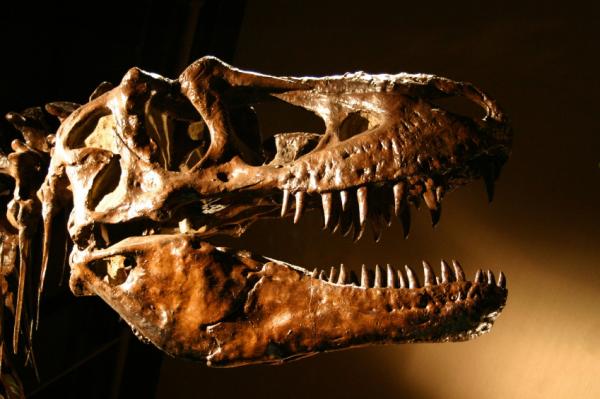Dr. Oliver Rauhut, paleontologist at Munich's Ludwig-Maximilians-Universität (LMU), and his colleague, Dr. David Hone, claim that carnivorous dinosaurs like Tyrannosaurus often hunt small dinosaurs. Rauhut said: 'Unlike their adult relatives, these young dinosaurs often do not pose any risk to predators. And their softer bones can add important minerals to the diet of theropods. We hope to find more fossil evidence to reinforce this hypothesis. '
King of tyrant dinosaurs, Tyrannosaurus rex is the most famous dinosaur. Even recent discoveries about larger dinosaurs - and perhaps even more terrifying - like Giganotosaurus, could not ' chase ' the 'mighty' of 'T-rex'. But what if the 'king' of the dinosaurs was just a hunter who hunted dragonflies, instead of a predator who was not afraid of prey larger than himself? Rauhut belongs to the Bayerische Staatssammlung für Paläontologie und Geologie and LMU Munich said: 'Animals like Tyrannosaurus are often considered to be a perfect' hunting machine 'with extremely violent bites that can knock out the biggest prey. . But the fossils show failure in the hunt for giant herbivorous dinosaurs of predatory dinosaurs - prey or runaway, or both prey and predator are dead '.
 Fossil evidence shows that giant carnivorous dinosaurs often hunt adolescent herbivorous dinosaurs, not adults. (Photo: iStockphoto / David Coder)
Fossil evidence shows that giant carnivorous dinosaurs often hunt adolescent herbivorous dinosaurs, not adults. (Photo: iStockphoto / David Coder)
In contrast, direct evidence of carnivorous dinosaur diets - gastric and fossilized diets - shows smaller or younger prey that has been digested. Rauhut and Hone, currently at the Archaeological and Ancient Anthropology Academy in Beijing, China, hypothesize that large carnivorous dinosaurs mostly eat small prey, and Only a few exceptions attack other large dinosaurs. Hone said: 'Even modern predators often choose old and sick animals, or small ones. These are easily prey and the risk of injury to predators is also much lower. This strategy may also have been adopted by dinosaurs. '
A closer look at recent predators shows an additional benefit of selecting young prey: Crocodile, the most recent relative of dinosaurs, has very strong acids in the stomach. They can completely break down the unstable bones of small prey, and add important nutrients to their diets. The fossils of juvenile dinosaurs are swallowed up by theropods that support this idea.
The lack of fossils also adds to the rationality of the hypothesis. Rauhut said: 'Dinosaur egg laying sites show a large amount of eggs and therefore the number of offspring is also high. But this fact is not reflected in the fossil record. Juvenile dinosaurs are rare - most probably eaten by predators. Hopefully soon, there will be evidence to help us really understand the hunting behavior of theropods'.
Refer:
1. David WE Hone and Oliver WM Rauhut.Feeding behavior and bone utilization by theropod dinosaurs.Lethaia, 2009;DOI: 10.1111 / j.1502-3931.2009.00187.x
 Discovered an ancient centipede fossil 99 million years old
Discovered an ancient centipede fossil 99 million years old Discovered bat-like dinosaurs in China
Discovered bat-like dinosaurs in China Discovered a 200-year-old bronze cannon of the coast
Discovered a 200-year-old bronze cannon of the coast Discover 305 million-year-old spider fossils
Discover 305 million-year-old spider fossils